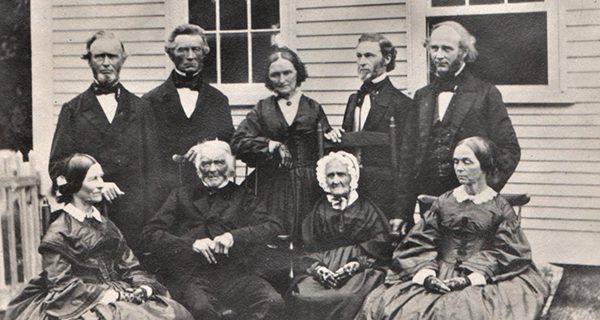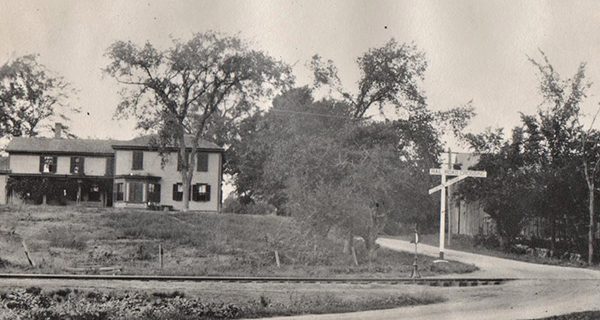[ccfic caption-text format="plaintext"]
Oftentimes, history focuses on the famous, the well-known, and those whose contribution stands out as a major accomplishment.
But the vast majority of people never become famous, do the best they can in life, often struggle to overcome adversity, and frequently are little-known outside their own small sphere where they live.
As reported by their grandson, a love story - a slice of life little known outside Medfield - began to take place back on the first day of April, 1798. On that day, a young man by the name of Jonathan Fiske of Weston, Massachusetts married a young woman by the name of Sally Flagg, also of Weston. Thus began their great adventure into their new life together. They decided to go out on their own, buying a house, land and a tannery on Harding Street in nearby Medfield. Jonathan was a tanner and he would make this new location his place of work and their home.
Following their wedding, they set out with all their belongings in a wagon pulled by a team of oxen. They made their way on one of the hottest days of the year over the winding dirt roads into Dover and then into Medfield. They stopped in front of the house of Robert Hinsdale (now 93 Harding Street), and there, were greeted by their new neighbor, who welcomed them to Medfield and invited them to come in and rest - but since their new home was now in sight, they could not stop. So, Robert Hinsdale, his 17-year-old grandson, Hinsdale Fisher, and another neighbor, Abraham Harding, helped them unload their furniture.
The house which was to become their home stood upon the rising ground overlooking the tannery, which was located on the west side of Harding Street where the railroad tracks use to cross the street. The tannery dated back to 1667, when Nicholas Rockwood was granted land and with his son, Samuel, set up the business. The house, built by Rockwood, was a humble dwelling with but two rooms and a kitchen on the first floor and two lofts under the roof above. It was built, as houses of that time were built, of heavy, hand-hewed timbers. There was a huge chimney located so as to furnish a large fireplace, with a brick oven on the side.
Jonathan and Sally were very frugal but thrifty and industrious. The tanning business prospered. As the years passed, more and more land was purchased until they had a farm of over 100 acres. As was the case back then, military service was required of all able-bodied males. Jonathan joined the Massachusetts Militia and on the sixth day of May, 1805, was commissioned Ensign. By 1807, he was promoted to Captain and by 1810, Major, the title by which he was known for the rest of his life. Military service only consisted of a few weeks, twice a year, spent in muster camps - but it still took time away from the tannery, farm and his family. At the time, they had six children. With his wife, family and business needing him, and after eight years of service to his country, he called an end to active military service. By 1816, the couple had seven children. It was at this time that four additional rooms were added to the house.
As a spinner, Sally made homespun cloth and once a year, a tailor came and from that cloth made a supply of clothes. Also, once a year, the cobbler came to the house with his tools, cut the patterns from the home-tanned leather, and fitted the entire family with a year’s supply of shoes.
As they aged, Sally was greatly loved by her grandchildren, with her pleasant smile and kindly disposition. Jonathan was silent in his older years, often sitting by the fire in cold weather, hour after hour, without speaking - possibly thinking over the long years of the past; his marriage to Sally, the first years in the small house, the tanning business, his military experiences and the rapid growth of his children.
Their son, Amos, became a successful merchant in Marlow, New Hampshire, and served in the New Hampshire state senate. George took over the farm and the tanning business. Their daughter, Sarah, married Francis D. Ellis and they moved to Boston, running a successful dry goods trade. Isaac was also a successful merchant and storekeeper in Medfield for 40 years, postmaster, and member of the state legislature. Son Charles was also a Boston merchant and elected to the legislature. Clarissa married Phineas Allen, a well-known educator of the Allen School in West Newton. Abagail remained unmarried and spent her life caring for her aging parents.
Jonathan would go into the fields to do a little work when he was well past the age of 80. He never swore or used obscene language, instead he would say “The dogs in ye!” He always carried a cane, which was actually a broomstick, which he would throw at the neighbor’s hens that got into his garden. Jonathan was well-respected by his fellow townspeople, as shown by his being elected selectman and as a Deacon of the Unitarian Church.
In 1863 Jonathan had fallen and rapidly grew weaker. Sally sat by his bedside the entire time. Finally, with his long white hair about his face, he looked up and said, “I’m going home.” He died an hour later.
Sally died the following year. Their grandson, George, moved into the house, removed the old part, and remodeled it into the house we see today as we drive by it on Harding Street going towards Dover - the first house on the left after you pass West Mill Street, the old tannery farm, the Fiske House, the place where Jonathan and Sally Fiske began their life together so very long ago.
Photos courtesy of Medfield Historical Society











